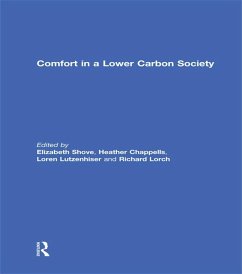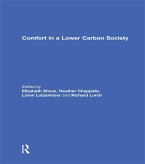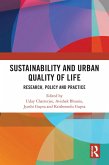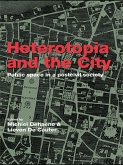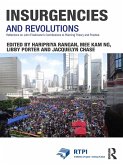Comfort in a Lower Carbon Society (eBook, PDF)
Redaktion: Shove, Elizabeth; Lutzenhiser, Loren; Chappells, Heather
57,95 €
57,95 €
inkl. MwSt.
Sofort per Download lieferbar

29 °P sammeln
57,95 €
Als Download kaufen

57,95 €
inkl. MwSt.
Sofort per Download lieferbar

29 °P sammeln
Jetzt verschenken
Alle Infos zum eBook verschenken
57,95 €
inkl. MwSt.
Sofort per Download lieferbar
Alle Infos zum eBook verschenken

29 °P sammeln
Comfort in a Lower Carbon Society (eBook, PDF)
Redaktion: Shove, Elizabeth; Lutzenhiser, Loren; Chappells, Heather
- Format: PDF
- Merkliste
- Auf die Merkliste
- Bewerten Bewerten
- Teilen
- Produkt teilen
- Produkterinnerung
- Produkterinnerung

Bitte loggen Sie sich zunächst in Ihr Kundenkonto ein oder registrieren Sie sich bei
bücher.de, um das eBook-Abo tolino select nutzen zu können.
Hier können Sie sich einloggen
Hier können Sie sich einloggen
Sie sind bereits eingeloggt. Klicken Sie auf 2. tolino select Abo, um fortzufahren.

Bitte loggen Sie sich zunächst in Ihr Kundenkonto ein oder registrieren Sie sich bei bücher.de, um das eBook-Abo tolino select nutzen zu können.
Historians, sociologists, environmentalists, geographers, and cultural theorists provoke and stimulate debate about the future of comfort in a lower carbon society.
This book was published as a special issue of Building Research & Information .
- Geräte: PC
- mit Kopierschutz
- eBook Hilfe
Andere Kunden interessierten sich auch für
![Comfort in a Lower Carbon Society (eBook, ePUB) Comfort in a Lower Carbon Society (eBook, ePUB)]() Comfort in a Lower Carbon Society (eBook, ePUB)57,95 €
Comfort in a Lower Carbon Society (eBook, ePUB)57,95 €![World Cities and Urban Form (eBook, PDF) World Cities and Urban Form (eBook, PDF)]() World Cities and Urban Form (eBook, PDF)51,95 €
World Cities and Urban Form (eBook, PDF)51,95 €![Sustainability and Urban Quality of Life (eBook, PDF) Sustainability and Urban Quality of Life (eBook, PDF)]() Sustainability and Urban Quality of Life (eBook, PDF)41,95 €
Sustainability and Urban Quality of Life (eBook, PDF)41,95 €![Heterotopia and the City (eBook, PDF) Heterotopia and the City (eBook, PDF)]() Heterotopia and the City (eBook, PDF)46,95 €
Heterotopia and the City (eBook, PDF)46,95 €![Vienna (eBook, PDF) Vienna (eBook, PDF)]() Vienna (eBook, PDF)0,00 €
Vienna (eBook, PDF)0,00 €![Cities for People, Not for Profit (eBook, PDF) Cities for People, Not for Profit (eBook, PDF)]() Cities for People, Not for Profit (eBook, PDF)59,95 €
Cities for People, Not for Profit (eBook, PDF)59,95 €![Insurgencies and Revolutions (eBook, PDF) Insurgencies and Revolutions (eBook, PDF)]() Insurgencies and Revolutions (eBook, PDF)45,95 €
Insurgencies and Revolutions (eBook, PDF)45,95 €-
-
-
Historians, sociologists, environmentalists, geographers, and cultural theorists provoke and stimulate debate about the future of comfort in a lower carbon society.
This book was published as a special issue of Building Research & Information.
This book was published as a special issue of Building Research & Information.
Dieser Download kann aus rechtlichen Gründen nur mit Rechnungsadresse in A, B, BG, CY, CZ, D, DK, EW, E, FIN, F, GR, HR, H, IRL, I, LT, L, LR, M, NL, PL, P, R, S, SLO, SK ausgeliefert werden.
Produktdetails
- Produktdetails
- Verlag: Taylor & Francis eBooks
- Seitenzahl: 136
- Erscheinungstermin: 13. September 2013
- Englisch
- ISBN-13: 9781317988809
- Artikelnr.: 57101161
- Verlag: Taylor & Francis eBooks
- Seitenzahl: 136
- Erscheinungstermin: 13. September 2013
- Englisch
- ISBN-13: 9781317988809
- Artikelnr.: 57101161
- Herstellerkennzeichnung Die Herstellerinformationen sind derzeit nicht verfügbar.
Elizabeth Shove is professor of Sociology at Lancaster University. She has written widely on theories of practice, technology, consumption, environment and everyday life. She is co editor (with Frank Trentmann and Rick Wilk) of Time, Consumption and Everyday Life: Practices, materiality and culture (Berg, forthcoming 2009). Heather Chappells is honorary research fellow in Geography at Lancaster University. She has undertaken several projects examining the social, institutional and cultural dimensions of sustainable consumption, provision and practices in the UK energy and water sectors - including Future Comforts: Reconditioning indoor environments with Elizabeth Shove (ESRC, 2003-2004). Loren Lutzenhiser is Professor of Urban Studies and Planning at Portland State University. His research focuses on the environmental impacts of socio-technical systems, particularly how urban energy and resource use is related to global environmental change.
1. Introduction: Comfort in a Lower Carbon Society Elizabeth Shove,
Heather Chappells, Loren Lutzenhiser and Bruce Hackett 2. Air-conditioning
and the 'homogenization' of people and built environments Stephen Healy 3.
Re-contextualizing the notion of comfort Raymond Cole, John Robinson,
Zosia Brown and Meg O'Shea 4. Conquering winter: US consumers and the cast
iron stove Howell Harris 5. Growth in mobile air-conditioning: a
socio-technical research agenda Graham Parkhurst and Richard Parnaby 6.
Understanding heat wave vulnerability in nursing and residential homes Sam
Brown and Gordon Walker 7. Escaping the house: comfort and the California
garden Gail Cooper 8. Comfort expectations: the impact of demand-management
strategies in Australia Yolande Strengers 9. New standards for comfort and
energy in building J. F. Nicol and M. A. Humphreys Commentaries 10. The
conditioning of comfort Harold Wilhite 11. Comfort in a brave new world
Ian Cooper 12. Are Comfort Expectations of Building Occupants Too High?
Mithra Moezzi 13. Cold Comfort in a High Carbon Society? Jim Skea 14.
Studying thermal comfort in context Russell Hitchings
Heather Chappells, Loren Lutzenhiser and Bruce Hackett 2. Air-conditioning
and the 'homogenization' of people and built environments Stephen Healy 3.
Re-contextualizing the notion of comfort Raymond Cole, John Robinson,
Zosia Brown and Meg O'Shea 4. Conquering winter: US consumers and the cast
iron stove Howell Harris 5. Growth in mobile air-conditioning: a
socio-technical research agenda Graham Parkhurst and Richard Parnaby 6.
Understanding heat wave vulnerability in nursing and residential homes Sam
Brown and Gordon Walker 7. Escaping the house: comfort and the California
garden Gail Cooper 8. Comfort expectations: the impact of demand-management
strategies in Australia Yolande Strengers 9. New standards for comfort and
energy in building J. F. Nicol and M. A. Humphreys Commentaries 10. The
conditioning of comfort Harold Wilhite 11. Comfort in a brave new world
Ian Cooper 12. Are Comfort Expectations of Building Occupants Too High?
Mithra Moezzi 13. Cold Comfort in a High Carbon Society? Jim Skea 14.
Studying thermal comfort in context Russell Hitchings
1. Introduction: Comfort in a Lower Carbon Society Elizabeth Shove,
Heather Chappells, Loren Lutzenhiser and Bruce Hackett 2. Air-conditioning
and the 'homogenization' of people and built environments Stephen Healy 3.
Re-contextualizing the notion of comfort Raymond Cole, John Robinson,
Zosia Brown and Meg O'Shea 4. Conquering winter: US consumers and the cast
iron stove Howell Harris 5. Growth in mobile air-conditioning: a
socio-technical research agenda Graham Parkhurst and Richard Parnaby 6.
Understanding heat wave vulnerability in nursing and residential homes Sam
Brown and Gordon Walker 7. Escaping the house: comfort and the California
garden Gail Cooper 8. Comfort expectations: the impact of demand-management
strategies in Australia Yolande Strengers 9. New standards for comfort and
energy in building J. F. Nicol and M. A. Humphreys Commentaries 10. The
conditioning of comfort Harold Wilhite 11. Comfort in a brave new world
Ian Cooper 12. Are Comfort Expectations of Building Occupants Too High?
Mithra Moezzi 13. Cold Comfort in a High Carbon Society? Jim Skea 14.
Studying thermal comfort in context Russell Hitchings
Heather Chappells, Loren Lutzenhiser and Bruce Hackett 2. Air-conditioning
and the 'homogenization' of people and built environments Stephen Healy 3.
Re-contextualizing the notion of comfort Raymond Cole, John Robinson,
Zosia Brown and Meg O'Shea 4. Conquering winter: US consumers and the cast
iron stove Howell Harris 5. Growth in mobile air-conditioning: a
socio-technical research agenda Graham Parkhurst and Richard Parnaby 6.
Understanding heat wave vulnerability in nursing and residential homes Sam
Brown and Gordon Walker 7. Escaping the house: comfort and the California
garden Gail Cooper 8. Comfort expectations: the impact of demand-management
strategies in Australia Yolande Strengers 9. New standards for comfort and
energy in building J. F. Nicol and M. A. Humphreys Commentaries 10. The
conditioning of comfort Harold Wilhite 11. Comfort in a brave new world
Ian Cooper 12. Are Comfort Expectations of Building Occupants Too High?
Mithra Moezzi 13. Cold Comfort in a High Carbon Society? Jim Skea 14.
Studying thermal comfort in context Russell Hitchings
